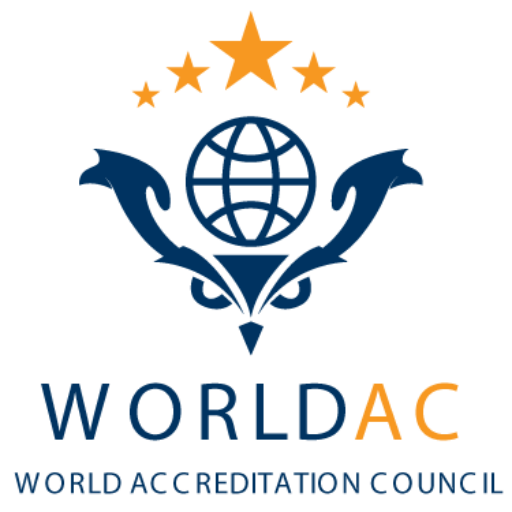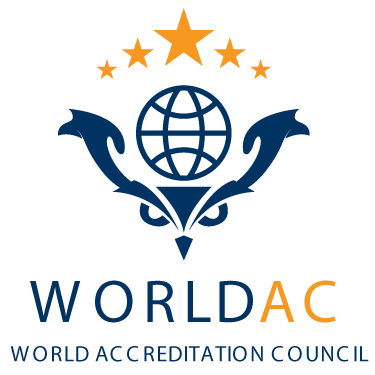ABOUT ACCREDITATION
ECTS Credits Certifications
The World Accreditation Council (WORLDAC) may certify the qualification of an institution to issue ECTS credits for any course, training, or program of study. To obtain this qualification to issue ECTS credits, the institution must demonstrate that the corresponding learning outcomes and study hours for the course, training, or program of study have been met.
Get certified by WORLDAC if you are interested in issuing ECTS credits.
What Are ECTS Credits?
ECTS stands for the European Credit Transfer and Accumulation System.
ECTS credits are based on the workload students need to achieve expected learning outcomes. Learning outcomes describe what a learner is expected to know, understand, and be able to do after successfully completing a process of learning. They relate to level descriptors in national and European qualification frameworks. Workload indicates the time students typically need to complete all learning activities (such as lectures, seminars, projects, practical work, self-study, and examinations) required to achieve the expected learning outcomes.
Institutions that apply ECTS publish their course catalogs online, including detailed descriptions of study programs, units of learning, university regulations, and student services. Course descriptions include learning outcomes (what students are expected to know, understand, and be able to do) and workload (the time students typically need to achieve the learning outcomes), expressed in terms of credits and hours of study.
How Does ECTS Work?
ECTS supports credit transfer and accumulation using key documents such as the course catalog, learning agreement, and transcript of records, as well as the Diploma Supplement. These tools facilitate recognition decisions about academic quality and accreditation, although the responsibility for these decisions remains with the relevant authorities, such as professors, university admission officers, recognition advisory centers, ministry officials, or employers.
The European Qualifications Framework (EQF) reduces the need for official validation procedures when education quality and training adhere to ECTS guidelines.
Why Are ECTS Credits Important?
Countries in Europe increasingly value recognizing all forms of learning, including formal and non-formal education. Recognizing these diverse learning experiences is essential for promoting lifelong learning and enhancing employability. While formal education is traditionally the most visible and widely recognized, non-formal education is gaining importance as it addresses the evolving needs of the global market.
ECTS Credit Standards
- 1 ECTS Academic Credit = 25 to 30 hours of study work.
- 60 ECTS Credits = A full-time year of formal learning (academic year).
- Typical student workload ranges from 1,500 to 1,800 hours for an academic year.
ECTS is a learner-centered system that increases transparency in learning outcomes and processes. It facilitates planning, delivery, evaluation, recognition, and validation of qualifications and learning units. ECTS is widely used in formal higher education and is increasingly applied to lifelong learning activities.
How Are ECTS Credits Certified?
Any educational institution wishing to issue ECTS credits must demonstrate, through the Application for Accreditation (Self-Assessment Report), that it meets several standards set forth by WORLDAC. To apply for certification to issue ECTS credits, institutions must:
- Visit the Online Application page on the WORLDAC website and complete the Application Form for ECTS Credits Certification.
- Pay the Secretary Services Fee and wait for an approval email from the WORLDAC Secretary.
- Pay the certification fee after receiving approval. (This fee is non-refundable.)
WORLDAC follows procedures similar to those used in the educational accreditation process, with adaptations to align with the European Higher Education Area guidelines on ECTS credits.
Once the application is received, WORLDAC will guide the institution in meeting the European guidelines for issuing ECTS credits. The certification process is less complex than full program accreditation and therefore involves lower costs.
Certified institutions will receive:
- An evaluation report detailing any improvements or adaptations needed to meet European ECTS guidelines.
- A certificate upon successful completion of the process.
Certified educational institutions may also be included in the list of accredited institutions on the WORLDAC website, provided the corresponding yearly maintenance fee is paid.
Important Clarifications
- ECTS is a Directive, Not an Organization
The European Credit Transfer and Accumulation System (ECTS) is a framework defined by the European Union. The EU encourages institutions to use this system but does not issue or directly recognize ECTS credits. - The Bologna Declaration
The Bologna Process is an agreement among European Ministries of Education to unify their educational systems under ECTS guidelines. While formal education falls under these guidelines, non-formal education is governed by the legal framework of individual countries. The European Higher Education Area recommends that non-formal education initiatives follow ECTS guidelines to enhance their recognition. - Non-Formal vs. Formal ECTS Credits
Institutions issuing ECTS credits must meet the requirements of the European Higher Education Area. Credits issued by formal institutions are recognized with official validity, while those issued by non-formal institutions are considered non-formal ECTS credits. Non-formal credits are more likely to be accepted if they meet ECTS requirements. Failure to comply with these requirements could result in credits being deemed fraudulent and subject to legal consequences. - WORLDAC’s Role
WORLDAC is not part of the European Union, the Bologna Process, or the European Higher Education Area. Instead, it is a European-based concil promoting educational quality by advising institutions on compliance with ECTS credit regulations and facilitating certification.
Benefits of ECTS Certification by WORLDAC
- Recognition: Institutions certified by WORLDAC can issue ECTS credits that comply with European guidelines, enhancing their credibility in the global education market.
- Mobility: ECTS credits facilitate international student mobility and credit transfers.
- Reputation: Certification demonstrates the institution’s commitment to high educational standards.
- Flexibility: The certification is applicable to both formal and non-formal education providers.
By following ECTS guidelines, institutions ensure better understanding and potential recognition of their programs on a global scale.


